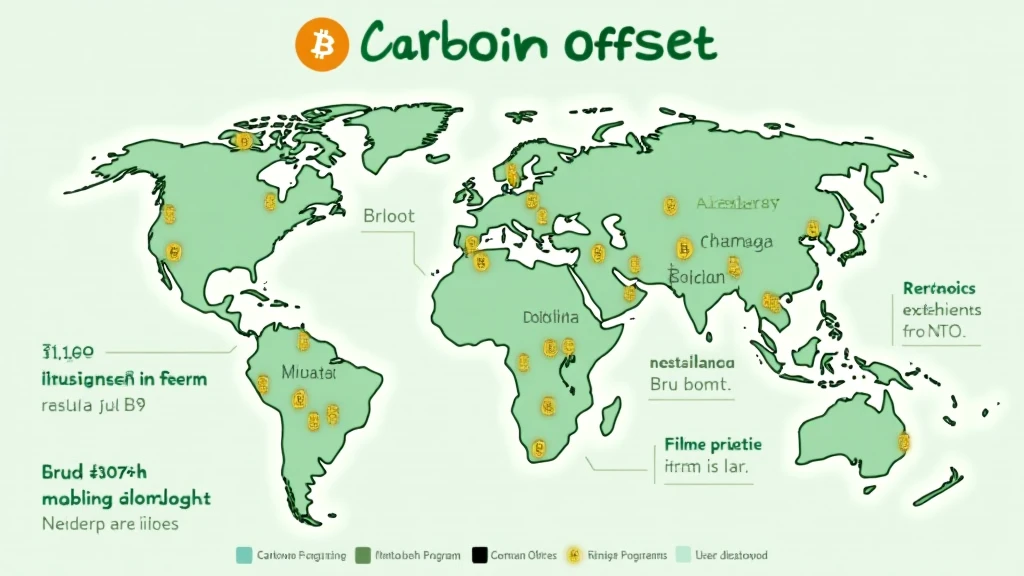
Bitcoin Carbon Offset Programs: A Sustainable Future for Cryptocurrency
As the cryptocurrency market continues to expand, the environmental impact of Bitcoin mining and transactions has become a pressing issue. In 2024, reports indicated that the total energy consumption of Bitcoin mining was comparable to that of entire countries. Against this backdrop, Bitcoin carbon offset programs have emerged as a solution to counterbalance the carbon footprint associated with cryptocurrency activities.
Understanding Bitcoin’s Environmental Impact
Bitcoin mining relies heavily on energy-intensive computations, which have drawn criticism from environmentalists and policymakers alike. According to a study by the Cambridge Centre for Alternative Finance, Bitcoin’s energy consumption was estimated at 110 TWh per year, raising concerns about the corresponding carbon emissions. This emphasizes the need for sustainable measures, such as carbon offset programs, to mitigate the effects of cryptocurrency on the environment.
What are Carbon Offset Programs?
A carbon offset program allows individuals and companies to compensate for their carbon emissions by investing in projects that reduce or capture greenhouse gases elsewhere. These projects may include reforestation, renewable energy initiatives, or energy efficiency improvements. The essence of such programs lies in their ability to provide a quantifiable means of reducing one’s carbon footprint while still participating in high-energy activities like Bitcoin mining.

The Mechanics of Bitcoin Carbon Offsetting
- **Assessment of Carbon Footprint**: Bitcoin miners assess their total emissions based on energy consumption.
- **Purchase of Carbon Credits**: Miners buy carbon credits equivalent to their emissions from verified offset providers.
- **Verification and Reporting**: Continuous monitoring ensures that the offset projects deliver on their promised reductions.
How Bitcoin Carbon Offset Programs Work
Here’s how it typically goes down: miners calculate their emissions, typically measured in tons of CO2, and then purchase an equivalent number of carbon credits. Each credit represents a reduction of one ton of CO2 from the atmosphere. It’s like balancing your checkbook by investing in sustainability. The beauty lies in supporting projects that tangibly contribute to a healthier planet.
Types of Carbon Offset Projects
There are several categories of projects that Bitcoin miners may invest in:
- Reforestation Projects: Planting trees that naturally absorb CO2 from the atmosphere.
- Renewable Energy Projects: Supporting wind, solar, and hydropower initiatives that produce clean energy.
- Energy Efficiency Projects: Initiatives that optimize energy use and reduce waste in communities.
The Role of Regulations in Carbon Offsets
As governments increasingly recognize the environmental impact of cryptocurrencies, regulations are becoming more prevalent. In Vietnam, for instance, the government is keen on promoting green energy and sustainability through various policies. According to the Vietnam Ministry of Industry and Trade, there is an anticipated annual growth in the adoption of renewable energy sources by more than 15% by 2025. This regulatory landscape can create a compelling framework for Bitcoin carbon offset programs.
Adopting Standards for Carbon Offsets
Standards such as the Verified Carbon Standard (VCS) and the Gold Standard are pivotal in ensuring that carbon offset projects are legitimate and provide genuine environmental benefits. Compliance with these standards guarantees that investments in carbon offsets are effective and transparent.
Benefits of Engaging in Carbon Offsetting for Bitcoin Miners
Participating in carbon offset programs can yield several benefits for Bitcoin miners:
- Reputation Management: Engaging in such programs enhances the public perception of Bitcoin miners as responsible contributors to environmental sustainability.
- Financial Incentives: In many cases, investing in renewable energy sources can reduce operational costs over time.
- Regulatory Compliance: Being proactive in carbon offsetting will help miners comply with existing and upcoming regulations concerning emissions.
Real-World Examples of Bitcoin Carbon Offset Programs
Several companies and organizations are leading the charge on carbon offset initiatives:
- Carbon Credit Exchange: This platform allows individuals and businesses to offset their carbon emissions by funding verified projects.
- Crypto Climate Accord: An initiative to decarbonize the cryptocurrency ecosystem by enabling the clean energy transition.
- BitGreen: A cryptocurrency focused on sustainability, supporting various carbon offset programs.
The Future of Bitcoin and Sustainability
The ongoing growth of Bitcoin necessitates a focus on sustainability. By actively participating in carbon offset programs, miners can contribute to a greener future while continuing their operations. Analysts predict that by 2025, more than 50% of Bitcoin mining operations will commit to using renewable energy sources.
Conclusion: A Balanced Approach to Cryptocurrency and Carbon Offsetting
As Bitcoin and other cryptocurrencies become more entrenched in our financial systems, it is crucial that we find ways to mitigate their environmental impact. Bitcoin carbon offset programs present a practical solution that enables miners and investors to align their interests with sustainability goals. Through collective efforts and a commitment to responsible practices, the future of cryptocurrency can be both bright and sustainable.
With the growth of the Vietnamese crypto market, where user adoption is rising rapidly, it is essential to consider how local regulations and carbon offset strategies can interact to foster a more sustainable economic environment. By integrating these initiatives, we not only protect the environment but also enhance the credibility and longevity of digital currencies.
If you’re interested in more resources on crypto sustainability practices, check our guide on carbon credits for crypto. Explore how other projects are embracing climate responsibility.
About the Author
Dr. Nguyen Tran is a leading expert in blockchain technology and environmental sustainability, having published over 15 research papers in the domain. He has spearheaded audits for prominent projects in the crypto space and continues to advocate for responsible practices in digital asset management.







